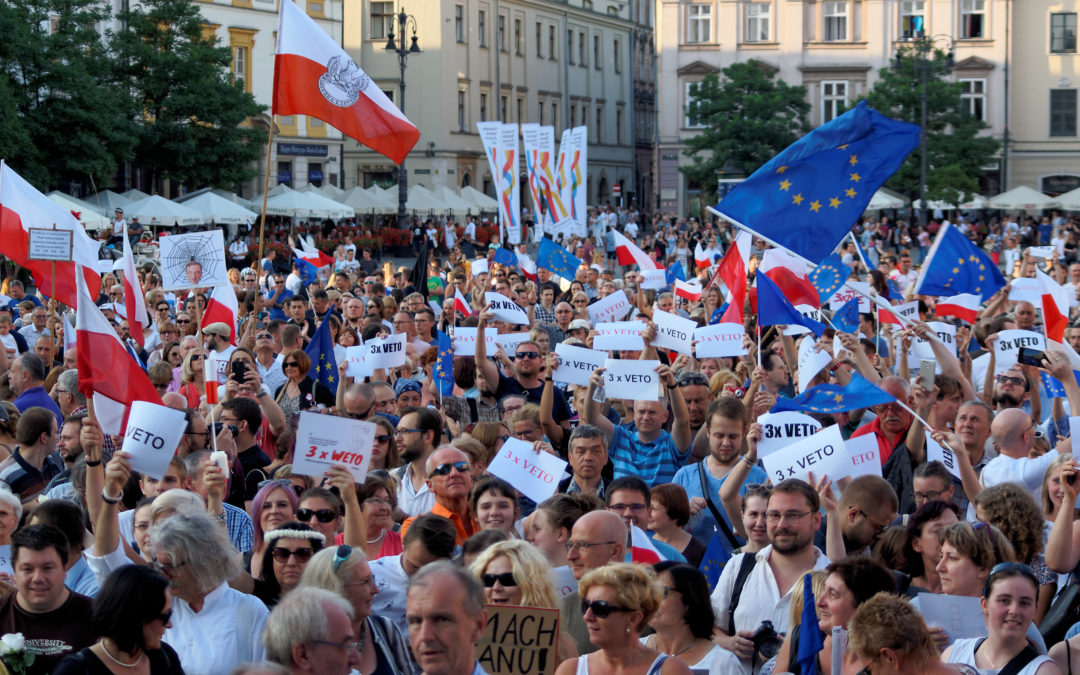Poles trust the European Union more than any other institution, finds a new poll. The government is the least trusted institution, while the church has recorded the biggest drop in trust.
The survey, conducted by IBRiS on behalf of the centre-right Rzeczpospolita daily, found that over two thirds of the public (68%) expressed trust in the EU. This marked an 11 percentage point rise since 2017, during which time the Polish government has often been in conflict with Brussels.
“This increase is significant. This contradicts the thesis about growing Euroscepticism,” Marcin Duma, the head of IBRiS, told the newspaper, adding that Brussels’ efforts to defend the rule of law in Poland may have increased trust in the EU among Poles.
Other polling has also shown that views on the European Union in Poland are overwhelmingly positive, and increasingly so. Pew Research Centre, for example, found last year that 84% of Poles have a favourable opinion of the EU, up from a low of 68% in 2013.
By contrast, the new IBRiS survey found that less than one third (30.5%) of Poles trust their government, putting it the bottom of the ranking. It did, however, improve slightly on its score of 27% in 2017.
🔵 W ciągu ponad 3. lat wzrosło zaufanie do #EU (o 11%), wojska (5,3%), mediów publicznych (4,6%), ale też do sądów (4,4%). Spadło do Kościoła (o 13,1%) i #NATO (o 8,7%).#sondaż @IBRiS_PL dla @rzeczpospolita @zuzannadabrows1https://t.co/yHrBq4Xcf8 pic.twitter.com/SjSZTL0eFY
— IBRiS (@IBRiS_PL) January 28, 2020
The largest decline was recorded by the church, whose level of trust fell over 13 percentage points, to 39.5%. The result reflects a period of crisis for the Catholic Church in Poland, which has faced criticism over its handling of child sex abuse in particular.
“We are dealing with the erosion of trust in the church,” said Duma. “This is associated with the crisis of the church in general, but certainly also with paedophilia scandals: citizens would like a quick and strong reaction, and [instead] they get a long and too placid process.”
A poll conducted in May last year by IBP found similar results, with 54% of Poles saying they do not trust the church and only 33% that they do. A large majority, 80%, believed that the church is not doing enough to protect children.
Another institution to record a significant drop in trust in the new IBRiS survey was NATO, which topped the ranking in 2017 but has since fallen almost nine percentage points to 66.4%. Why the decline?
“Attitudes towards NATO may be affected by sympathy for America”, which is very high in Poland, says Duma, who notes that it is increasingly Donald Trump who “plays the leading role, and not the alliance”.
Poland’s army (67.7%), which the current government has been seeking to strengthen, came second in the trust ranking, while the police were fourth (65.7%).
Private media have the trust of just half the population (50.2%), while public media, which have come under the influence of the ruling party, are trusted by only a third (34.4%).
The news tonight on Polish state TV:
– "Putin supports the Polish opposition"
– "Attack on Polish sovereignty"
– "Abroad, they do not want a strong Poland" ("some countries do not like that Poland is becoming key to the whole EU economy")
– "Opposition beyond reason and decency" pic.twitter.com/vmdqlsXXML— Daniel Tilles (@danieltilles1) January 28, 2020
Poland’s courts, which are currently at the heart of a battle between the government and judges, are trusted by 41.1%, a 4.4 percentage point rise since 2017. By contrast, the Constitutional Tribunal, which was taken over by the ruling party in 2016, is trusted by only 32.5%.
Main image credit: Jakub Hałun/Wikimedia Commons (under CC BY-SA 4.0)

Daniel Tilles is editor-in-chief of Notes from Poland. He has written on Polish affairs for a wide range of publications, including Foreign Policy, POLITICO Europe, EUobserver and Dziennik Gazeta Prawna.




















